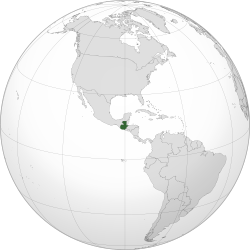Guatemala
Republic of Guatemala República de Guatemala (Spanish) | |
|---|---|
| Motto: "País de la Eterna Primavera" "Land of the Eternal Spring"[1] | |
| Anthem: Himno Nacional de Guatemala National anthem of Guatemala | |
 | |
| Capital and largest city | Guatemala City 14°38′N 90°30′W / 14.633°N 90.500°W |
| Official languages | Spanish |
| Demonym(s) | Guatemalan |
| Government | Unitary presidential Constitutional republic |
| Bernardo Arévalo | |
| Karin Herrera | |
| Independence | |
• from Spain | September 15, 1821 |
| Area | |
• Total | 108,889 km2 (42,042 sq mi) (107th) |
• Water (%) | 0.4 |
| Population | |
• July 2011 estimate | 13,824,463 (69th) |
• July 2007 census | 12,728,111 |
• Density | 129/km2 (334.1/sq mi) (85th) |
| GDP (PPP) | 2011 estimate |
• Total | $73.022 billion[2] |
• Per capita | $4,965[2] |
| GDP (nominal) | 2011 estimate |
• Total | $46.383 billion[2] |
• Per capita | $3,154[2] |
| Gini (2007) | 55.1 high |
| HDI (2011) | medium · 131st |
| Currency | Quetzal (GTQ) |
| Time zone | UTC−6 (CST) |
| Driving side | right |
| Calling code | +502 |
| ISO 3166 code | GT |
| Internet TLD | .gt |
Guatemala is a country in Central America. Its culture is a mix of both Mayan and Spanish cultures from the colonial period. Guatemala has many languages, a total of 23. Because of its natural beauty, it is a popular tourist destination. Its weather changes often because of the mountain range which crosses the center of the country.
The capital of Guatemala is Guatemala City. Guatemala is the world's largest producer and exporter of cardamom.[4] Its neighbors are Belize, Mexico, El Salvador and Honduras.
Population[change | change source]
It has the largest population in Central America. More than fourteen million people live in the 22 Guatemalan departments. Most of the population is made up of mestizo (mixed race) people, who are a combination of Native and European people. Mestizo are 40% of the population. Native Mayan people are 49% of the population, while 9% are direct descendants of Spanish and German people. Black people are 2% of the population.
History[change | change source]
The capital was moved several times because of natural disasters. The first city was destroyed when the volcano Volcan de Agua erupted, forcing the move to what today is called Antigua Guatemala. This city was destroyed by earthquakes. Finally, the capital was moved to Guatemala City.
- Guatemala
-
Guatemala City
-
Zacapa
-
Zacapa
-
Tikal
-
Tikal
-
Flores
-
Solola
-
Solola cemetery
Photo[change | change source]
Related pages[change | change source]
References[change | change source]
- ↑ Aguirre, Lily (1949). The land of eternal spring: Guatemala, my beautiful country. Patio Press. p. 253.
- ↑ 2.0 2.1 2.2 2.3 "Guatemala". International Monetary Fund. Retrieved December 22, 2011.
- ↑ "Human Development Report 2011" (PDF). United Nations. 2011. Retrieved December 22, 2011.
- ↑ "Cardamom and Guatemala" (PDF). Archived from the original (PDF) on 2016-03-04. Retrieved 2015-08-04.










